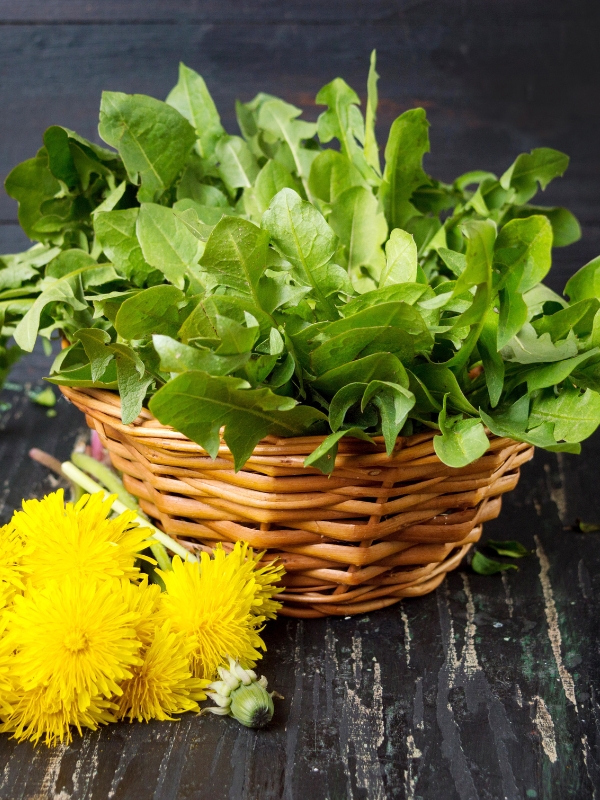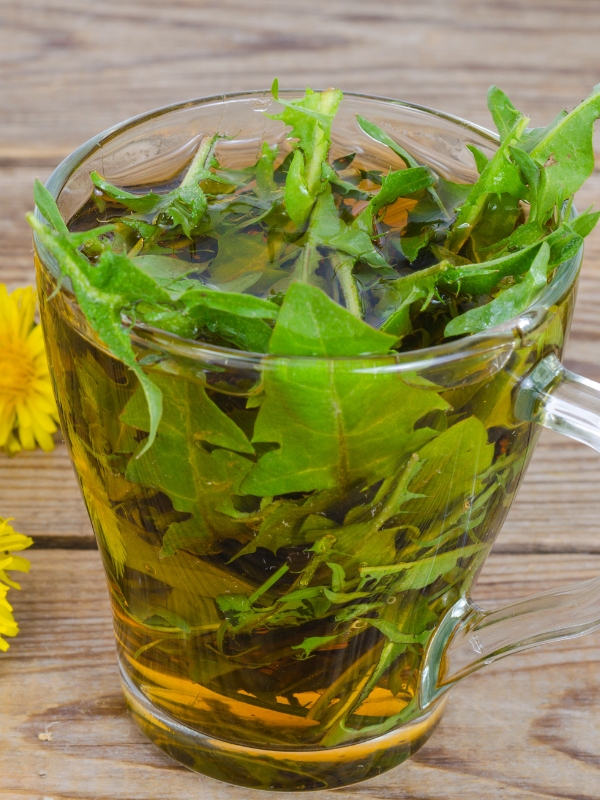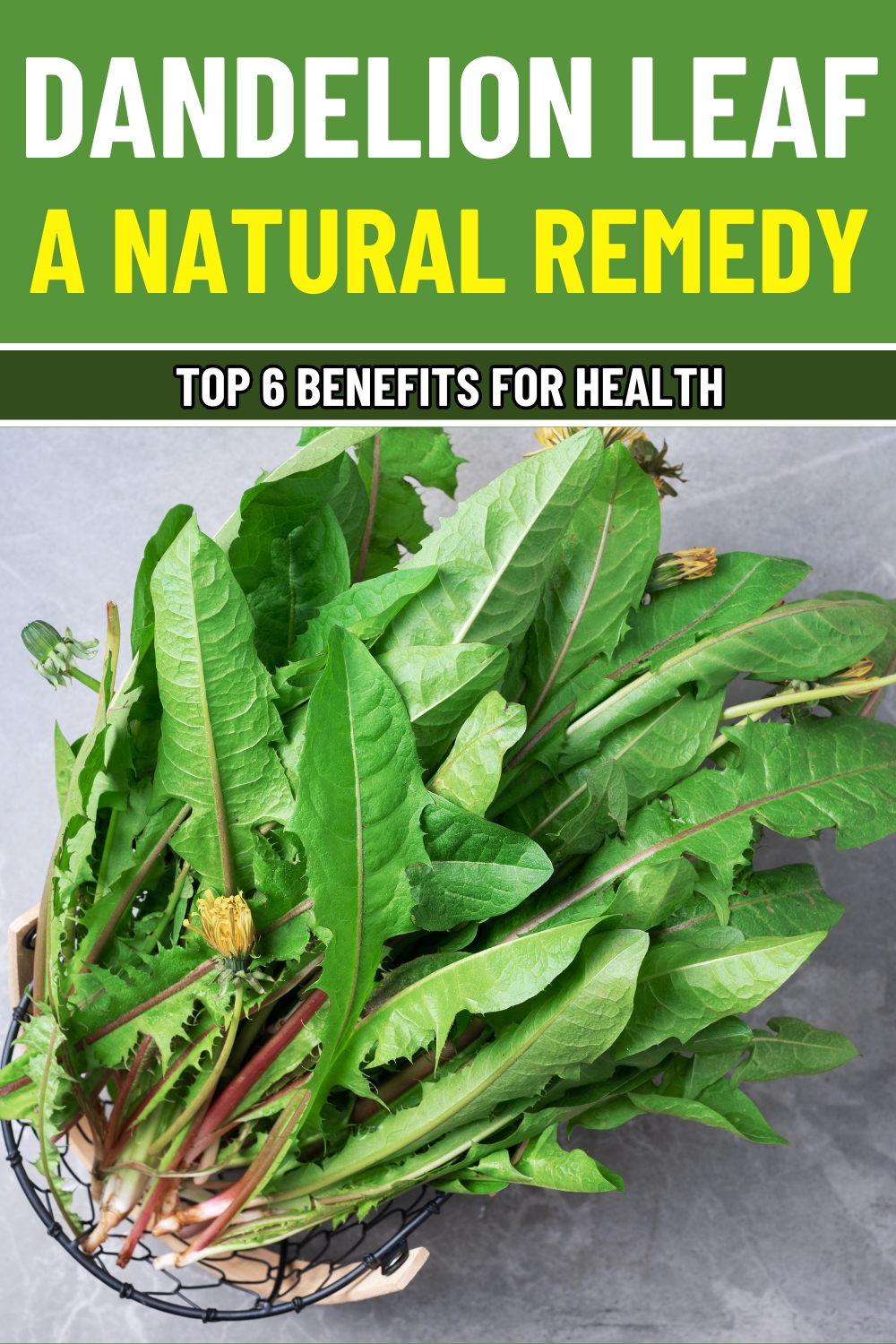What if the humble dandelion sprouting in your backyard wasn’t just a pesky weed but a powerhouse of health benefits waiting to be unleashed?
Long treasured in herbal medicine and now gaining recognition in modern wellness circles, dandelion leaves (Taraxacum officinale) offer a surprising range of nutrients and healing properties.
Packed with antioxidants, vitamins, and minerals, these vibrant greens are much more than meets the eye, ready to boost your vitality one leaf at a time.
Let’s explore the fascinating benefits of dandelion leaves and important precautions for their use.
#1. Supports Liver Detoxification
Dandelion leaves are renowned for their ability to support liver health. They stimulate bile production, aiding in the digestion of fats and the elimination of toxins from the body.
Research published in Oxidative Medicine and Cellular Longevity (2017) confirmed that dandelion leaves protect the liver from oxidative stress and reduce inflammation.
100 grams of fresh dandelion leaves contain approximately 35 mg of vitamin C, which helps combat oxidative damage and promotes liver function.

#2. Acts as a Natural Diuretic
Dandelion leaves are a gentle and potassium-sparing diuretic, promoting kidney function by increasing urine production. This aids in flushing out toxins, excess salts, and water from the body.
A study in the Journal of Alternative and Complementary Medicine highlighted that dandelion leaves effectively increase diuresis while maintaining potassium levels, unlike synthetic diuretics.
A serving of dandelion leaves provides about 397 mg of potassium, supporting electrolyte balance and cardiovascular health.
#3. Regulates Blood Sugar Levels
Dandelion leaves contain bioactive compounds like chicoric acid and chlorogenic acid, which have shown potential in regulating blood sugar levels. These compounds improve insulin sensitivity and reduce post-meal blood sugar spikes.
According to a study published in Nutritional Research and Practice, regular consumption of dandelion leaf extract can benefit individuals managing diabetes or prediabetes.

#4. Fights Inflammation
The polyphenols and flavonoids in dandelion leaves make them potent anti-inflammatory agents. These compounds reduce pain and swelling, particularly in conditions like arthritis and muscle soreness.
A review in the Journal of Medicinal Food emphasized dandelion’s effectiveness in reducing inflammation linked to cardiovascular diseases and inflammatory bowel conditions.
#5. Improves Digestive Health
Dandelion leaves are an excellent source of dietary fiber, with 100 grams providing about 3.5 grams. This fiber promotes healthy digestion, supports gut bacteria, and prevents constipation.
Drinking dandelion leaf tea before meals can also stimulate appetite and alleviate symptoms of indigestion and bloating.

#6. Boosts Immunity
Dandelion leaves fortify the immune system through their high content of vitamin C (approximately 35 mg per 100 grams of fresh leaves) and beta-carotene, a precursor to vitamin A.
These nutrients enhance white blood cell function and help the body ward off infections.
Their antioxidant properties also protect immune cells from oxidative damage, keeping the body resilient against seasonal illnesses.
How to Use Dandelion Leaves
- Dandelion leaf tea: Prepare a detoxifying tea by steeping 6–8 fresh leaves in boiling water for 10 minutes. Strain and enjoy warm to support liver detoxification and digestion.
- Add to salads: Incorporate young, tender dandelion leaves into salads. Their slightly bitter taste pairs well with sweet dressings, nuts, and fruits, making for a nutrient-rich meal.
- Smoothies: Blend dandelion leaves with spinach, banana, and almond milk for a refreshing smoothie. This is an easy way to boost your intake of fiber, antioxidants, and vitamins.
- Dry leaf powder: Dry and grind dandelion leaves into a fine powder. Use it as a seasoning for soups, stews, or sauces, enhancing both flavor and nutritional value.

Cautions and Precautions
People allergic to ragweed, daisies, or marigolds may also react to dandelion leaves. You should perform a patch test before use.
Dandelion leaves may interact with diuretics, blood thinners, or diabetes medications. Consult your doctor if you are on any of these treatments.
There is limited research on dandelion safety during pregnancy or breastfeeding. Only forage dandelion leaves from pesticide-free and untreated areas to ensure safety and purity.
Disclaimer
This article is for informational purposes only and does not replace professional medical advice.
Consult your healthcare provider before using dandelion leaves as a remedy, especially if you have underlying health conditions or are on medications.

Dandelion Leaf: Surprising Health Benefits and Essential Precautions
